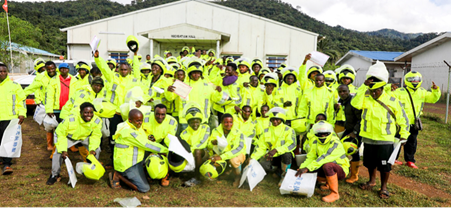On August 12, 2025, the tranquil mining town of Yekepa, nestled within the Nimba mountains of Liberia, became the backdrop for a critical intervention in road safety. ArcelorMittal Liberia (AML), in partnership with the Liberia National Police, orchestrated a comprehensive one-day training program specifically designed for the region’s commercial motorcyclists. This initiative, spearheaded by AML’s Health & Safety Department, brought together approximately 150 riders who represent a significant portion of the local transportation network. Recognizing the inherent risks associated with motorcycle operation, particularly within a developing nation like Liberia, AML sought to equip these riders with the knowledge and tools necessary to navigate the roads safely and responsibly. The training encompassed a multifaceted approach, blending theoretical instruction with practical guidance, and culminating in the distribution of essential safety equipment, including helmets and reflective jackets, to each participant. This holistic strategy underscored AML’s commitment to fostering a culture of safety within the community.
The urgency of this training was underscored by the alarming statistics on road accidents in Liberia. Data from 2024 revealed that motorcycle accidents constituted a significant portion of the 138 recorded incidents, with young riders between the ages of 18 and 35 disproportionately represented. This demographic often turns to commercial motorcycling as a primary source of income, sometimes foregoing formal education to support their families. This economic reality necessitates targeted interventions that address the specific vulnerabilities of this group. AML’s initiative directly responded to this need, providing not just theoretical knowledge but tangible protective gear, emphasizing the practical application of safety principles. The training served as a crucial link between awareness and action, empowering riders to mitigate risks and protect themselves from potentially life-altering injuries.
The training sessions were facilitated by a collaborative team comprising AML’s Safety Manager, Ahmad Massaquoi, AML’s Transport Coordinator, Koffa Slewion, and officers from the Yekepa detachment of the Liberia National Police. This partnership ensured a comprehensive curriculum that incorporated both industry best practices and local law enforcement perspectives. Mr. Massaquoi emphasized the paramount importance of cautious and responsible riding, highlighting the direct correlation between safe practices and the preservation of life. He further stressed the shared responsibility of all stakeholders – riders, companies, and law enforcement – in fostering a safer road environment. This collaborative approach ensured that the training resonated with the participants and fostered a sense of collective ownership in promoting road safety.
Mr. Slewion’s presentation delved into the critical role of helmets in mitigating head injuries. He poignantly described the head as the repository of one’s being, underscoring the devastating consequences of head trauma. He explained how helmets, though seemingly simple devices, significantly reduce the severity of impacts during accidents, acting as a vital buffer between the skull and potential hazards. Beyond the immediate physical trauma, Mr. Slewion also highlighted the potential for long-term, unseen damage from head injuries, even in cases where the individual appears outwardly unharmed. This emphasis on the unseen consequences of head injuries served to underscore the importance of consistent helmet use, transforming it from a simple safety measure to a crucial life-preserving tool.
The collaborative nature of the training was further exemplified by the active participation of Police Commander Horace T. Zeigeay. Commander Zeigeay commended AML for its proactive approach to road safety, acknowledging the significant contribution of providing safety materials to the riders. He reinforced the importance of individual responsibility, urging the motorcyclists to prioritize their own safety. Beyond general safety principles, Commander Zeigeay addressed specific violations of Liberia’s Vehicle and Traffic Law frequently observed among motorcyclists. These included distractions such as loud music and earpieces, improper attire like riding in slippers, reckless driving behaviors such as competing with faster vehicles, and dangerous overtaking maneuvers. By highlighting these common infractions, Commander Zeigeay connected the training to the practical realities of the road, providing actionable guidance for safer riding practices.
The training concluded with a shared commitment to road safety among all participants. AML, the Liberia National Police, and the motorcyclists collectively acknowledged the paramount importance of prioritizing life preservation within the Yekepa region. The distribution of helmets and reflective jackets served as a tangible reminder of this commitment, providing riders with the necessary tools to put their training into practice. This event served as a powerful example of how collaborative efforts between industry, law enforcement, and the community can create meaningful change and foster a safer environment for all. The initiative not only equipped motorcyclists with essential safety knowledge and protective gear but also instilled a sense of shared responsibility for road safety within the Yekepa community. This holistic approach, combining education, equipment, and enforcement, lays the foundation for a more sustainable and impactful road safety culture.














